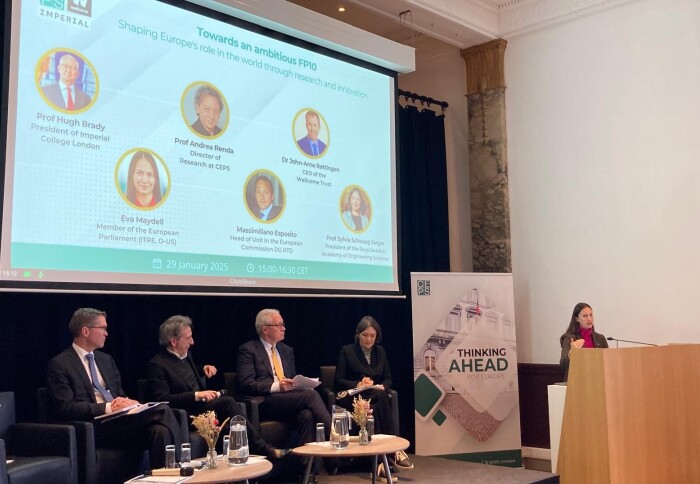Experts set out vision for future of European scientific collaboration

A new report explores how Europe can harness its strength in science to drive economic, social and environmental progress.
The report, Towards an Ambitious FP10 - launched by Imperial College London, Wellcome, and the Centre for European Policy Studies (CEPS) - provides recommendations for the EU’s upcoming tenth Framework Programme for Research and Innovation (FP10).
"This report provides new ideas for FP10 to be transformational for Europe’s research and innovation ecosystem and beyond." Professor Hugh Brady President, Imperial
FP10 is the EU’s next seven-year research and innovation framework programme, which will succeed Horizon Europe from 2028. It is expected to play a pivotal role in driving scientific excellence, technological leadership, and sustainable development for Europe and beyond.
The report provides several recommendations on its future structure, governance, and goals, based on guidance from an Advisory Group of 15 experts. It explores governance, structure, budget, and how FP10 can address global challenges and boost competitiveness. It highlights:
- The importance of science and Framework Programmes to solving global challenges and meeting the new EC’s priorities
- That excellence and the ERC are critical to the Programme’s success
- The need for an FP10 that is open to global collaboration, including in competitiveness instruments
The report was launched at an event in Brussels on Wednesday 29 January, hosted by Professor Hugh Brady, President of Imperial College London, and Dr John-Arne Røttingen, CEO of the Wellcome Trust, and chaired by Professor Andrea Renda, Director of Research at CEPS.
The event brought together more than 100 attendees, including officials from the European Commission, Members of the European Parliament, and representatives from the EU and European science communities.
Unparalleled scale
Professor Hugh Brady, President of Imperial College London said: “For decades the EU’s R&D Framework Programmes have been of unparalleled scale, enabled multilateral collaboration and provided access to critical knowledge, infrastructure and networks for scientific discovery and technological innovation. This report provides new ideas for FP10 to be transformational for Europe’s research and innovation ecosystem and beyond.”
Dr. John-Arne Røttingen, CEO of the Wellcome Trust, said: "The health challenges we face, whether mental health, infectious diseases, or the health impacts brought on by climate change, are all global. It is clear we need a unified effort to tackle them, rooted in scientific discoveries. This report outlines a unique opportunity in FP10 to create a bold, equitable and collaborative framework which will drive progress through research and innovation - in Europe and beyond."
EU Framework Programmes have funded many collaborations at Imperial, supporting our researchers to work with colleagues across Europe on vital issues: ranging from new diagnostic tools for childhood disease, an AIDS vaccine and combatting wildfires to quantum, data and climate technologies.
The programme includes the European Research Council (ERC) which funds the best scientists for cutting-edge research at the frontiers of knowledge in their field.
Recent grant winners include Dr Ledesma Amaro (Bioengineering), whose project is focused on making sustainable food and textile colourants and dyes more efficient by using engineered microorganisms, and Dr Sam Asher, Associate Professor of Economics at the Business School, who is using ERC funding to research the relationship between economic development and cultural change in India.
Article text (excluding photos or graphics) © Imperial College London.
Photos and graphics subject to third party copyright used with permission or © Imperial College London.
Reporter
Lisa Bungeroth
College Headquarters
Deborah Evanson
Communications Division